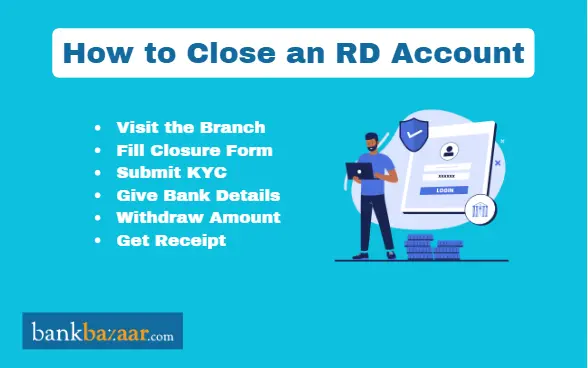How to Close an RD Account (2026 Guide)
Closing a Recurring Deposit (RD) account in India can be done either before or after its maturity, and the process varies slightly depending on whether it's held with a bank or a post office.
What is an RD Account?
A Recurring Deposit (RD) account is a fixed-term investment option offered by banks and post offices, where a fixed amount is deposited monthly. It helps inculcate a savings habit and offers assured returns. However, there may come a time when you want or need to close it before maturity.
Reasons for Closing an RD Account
- Financial emergency or liquidity needs
- Switching to better investment options
- Reallocation of funds
- Completion of financial goal
Documents Required to Close an RD Account
To initiate the closure process, keep these documents handy:
- RD account passbook or statement
- Valid photo ID (Aadhaar, PAN, Voter ID, etc.)
- Bank-issued RD closure form (can be downloaded or obtained from the branch)
- Cancelled cheque or account details for fund transfer
How to Close an RD Account: Step-by-Step Process
1. Visit the Bank/Post Office Branch
Go to the branch where your RD account is held. Some banks may allow online closures—check your provider's facility.
2. Fill the RD Closure Form
Provide details such as account number, name, and reason for closure. Attach required documents.
3. Submit KYC Documents
Identity verification is mandatory. Submit a photocopy of your Aadhaar or PAN card along with the original for verification.
4. Withdraw the Final Amount
Once the request is processed:
- If closing after maturity, you receive the principal plus interest.
- If closing before maturity, you may incur penalties and reduced interest.
5. Receive Closure Acknowledgement
Always collect the acknowledgment or receipt confirming the closure.

Closing RD Account Before Maturity: What You Should Know
- Premature closure is allowed after a minimum lock-in period (typically 3-6 months).
- Penalty charges apply and interest may be paid at a reduced rate.
- Some banks require written consent or have a minimum notice period.
Can You Close an RD Account Online?
Yes, some banks offer online RD closure through:
- Net banking portal
- Mobile banking app
Steps may vary by provider. Look under “Deposits” or “Account Closure” in the dashboard.
Things to Consider Before Closing
- Check the interest rate differential for early closure.
- Compare with other investment options before switching.
- Ensure there are no pending installments or charges.

FAQs on How to Close an RD Account
- Can I close my RD account before the maturity date?
Yes, but it may involve a penalty and reduced interest payout.
- How long does it take to close an RD account?
Typically, 1–3 working days, depending on the bank or post office.
- Is there a fee for closing an RD account?
Most banks do not charge a fee, but penalties apply on premature closure
- Can I close an RD account online?
Some banks offer online closure through net banking or mobile apps.
- What happens if I miss an RD installment and want to close the account?
You can still close it, but the bank may deduct penalties from the final payout.
- Can I close an RD account from a different branch?
In most cases, RD accounts must be closed at the branch where they were opened. However, some banks allow inter-branch closures or offer online options.
- Will I receive a certificate or document after RD closure?
Yes, banks usually issue a closure receipt or confirmation letter detailing the payout and closure date
- Can I close a joint RD account?
Yes, but all account holders must sign the closure form and submit valid ID proof unless operating under “Either or Survivor” mode.
- Is TDS deducted on RD account closure?
Yes, if the total interest exceeds ₹40,000 (₹50,000 for senior citizens) in a financial year, TDS is deducted as per applicable rules.
- Will closing an RD affect my credit score?
No, RD accounts are not credit-linked and do not impact your credit score whether closed early or on maturity.

Disclaimer
Credit Card:
Credit Score:
Personal Loan:
Home Loan:
Fixed Deposit:
Copyright © 2026 BankBazaar.com.
